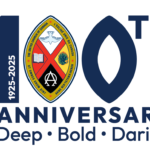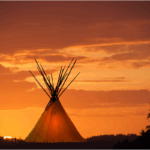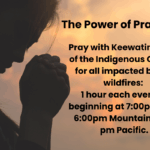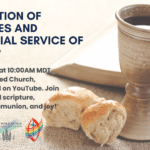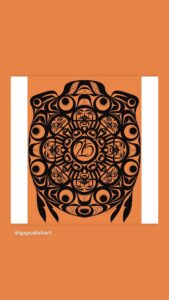
Art by Chase Gray, to honour the 215 children found at the Kamloops Indian Residential School. For non profit/ educational use only. www.gaysalishart.com
If you are a residential school or intergenerational survivor and this content is upsetting, please call the National Indian Residential School Crisis Line at 1-866-925-4419.
With Indigenous Ministries and Justice of the United Church, we join in saying, “As news came on May 28, 2021, that the remains of 215 children were found in a mass unmarked grave on the grounds of the former Kamloops Residential School, we entered into a time of mourning for these relatives, their families, and their communities.”
Many people are asking what they can do. Below are some ideas and resources, but they are accompanied by these words from the same statement: “We understand the desire to do “something” that will make this right. But we ask you, right now, to come together as people of the United Church and take the first step of mourning and remembering.”
Be shocked but not surprised
Mary Ellen Turpel-Lafond, director of the Residential School History and Dialogue Centre at the University of British Columbia writes, “Many Canadians have expressed their horror, shock and sadness at the announcement that the unmarked buried remains of 215 children were discovered in preliminary radar findings last weekend at the site of the former Kamloops Indian Residential School in British Columbia. And we should be sad; it is horrific. But it is not shocking. In fact, it is the opposite – a too-common unearthing of the legacy, and enduring reality, of colonialism in Canada. To the degree it is shocking, it is evidence of how much learning there is still to do.” (Click here for the full article. A free account may be required to access this.)
Honour and support ongoing work
Far from the headlines, many Indigenous communities, and sometimes small group of allies, have been working for years to document deaths, identify burial grounds, and care for or access known cemeteries that may now be on privately held land. The National Student Memorial Registry is held by the National Centre for Truth and Reconciliation and is “the result of work by countless people and the advice, guidance and blessings from Survivors, Elders and Knowledge Keepers”.
Regional examples with United Church involvement include the Remembering the Children Society; The Regina Indian Industrial School Commemorative Society; and work related to the Brandon Residential School. (Content warnings for all of these links.) Get to know which “schools” were closest to your community, and research what work survivors, their communities, and their allies have already begun, and that you may be able to support.
Support Indigenous-led efforts as appropriate
And follow the lead of Indigenous organizations and communities. These can be vigils, or fundraising, or education spaces, and much more. In some areas, provincial or territorial organizations have called for immediate, thorough, and fully funded investigation of unmarked burial sites. Please look into this, and consider how you and/ or your community of faith can support and participate.
Calls to address profoundly harmful government practices are also part of our collective responsibility. For example, despite human rights rulings by Canadian courts, the federal government continues to underfund Indigenous education. Indigenous children are enormously over-represented in Canada’s child welfare system. The First Nations Child and Family Caring Society has fought for years to address both of these realities, and more, and has done so with powerful youth leadership. Please learn more here. There are many more such examples of the ways in which colonization and systemic racism are alive and well in Canada today, many organizations and communities who are confronting this, and need our voices, efforts, and support.
Continue to educate ourselves and each other
If we are surprised at this news, may we educate ourselves and commit to learning, rather than blaming ourselves, or feeling it is an immediate settler/ immigrant responsibility to fix things. It’s important to recognize that the system of colonization that is still alive and well in Canada is designed to minimize how much we know. It’s also designed to dismiss Indigenous truths, teachings, and leadership. Let’s resist that, and support each other in the learning journey.
Volume 4 of the Truth and Reconciliation Commission’s final report is a good place to start; it focuses on missing children and unmarked burials. Please also take time to reflect on the Calls to Action. All of the work of the TRC is a gift to us from survivors, their families, and their communities. May we listen, learn, and change. In addition, June is Indigenous History Month; June 20 is Indigenous Day of Prayer; and June 21 is national Indigenous Day. Show up for, and support, local events. Please ensure the month is honoured in Sunday worship and please develop and include land and treaty acknowledgements regularly.
Consider offering financial support where you are able
The Healing Fund of the United Church of Canada addresses some of the intergenerational impacts of colonization and genocide and funds Indigenous-led healing work both beyond and within the church. It welcomes our support. Support for the Indian Residential Schools Survivors Society, and more local options, is also crucial.


